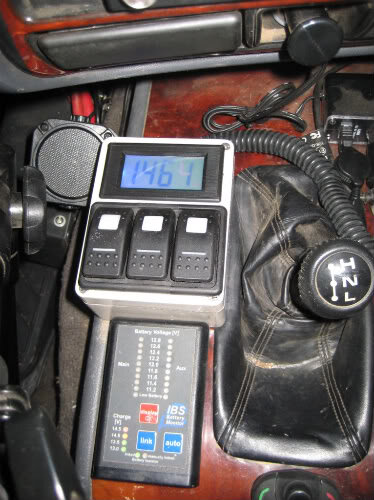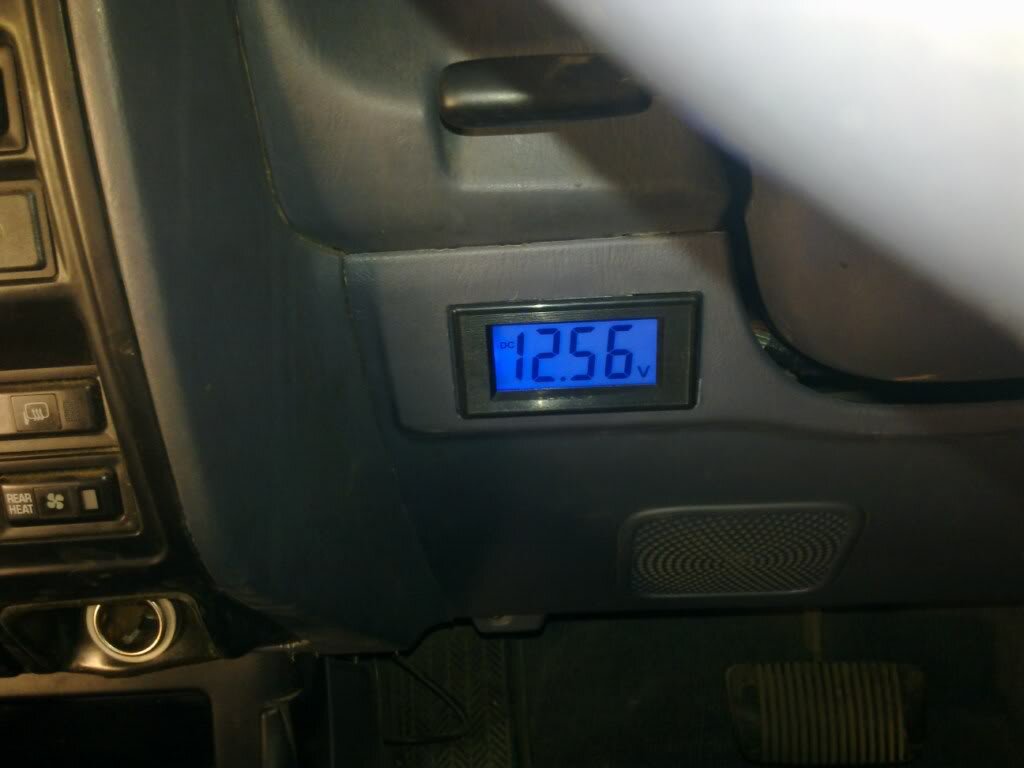Don't like the adverts? Click here to remove them
You are using an out of date browser. It may not display this or other websites correctly.
You should upgrade or use an alternative browser.
You should upgrade or use an alternative browser.
Battery monitors - best way to monitor battery status?
- Thread starter Lorin
- Start date
AndyCook said:24Seven said:Just bought a couple of these. I will fit one in the front somewhere and one in by the rear door I think. I took chance on a Hong Kong sale as it's not much money to lose if it all goes pear shaped.
looks like another mass-buy landcruiser club bargain!!!
Mine arrived today, tested and working fine..............hard to believe they only cost £3.19 inc Del
Dave Burgess
Well-Known Member
- Joined
- Apr 1, 2010
- Messages
- 247
Mine arrived yesterday too, and making a couple of educated guesses on feedback, we have some very strange user names on Ebay! 

Chas
Well-Known Member
Bought one, now fitted in a project box with three Carling switches from X-Eng, great, when the engine is running I've got 14.67v charging,

but what does this tell me? I assume this means I've got that voltage going to all three batteries but what, if anything, would happen if I linked the batteries through the IBS split charging system for starting or winching. At the moment I have it plugged into a ciggy lighter socket before permanently hard wiring it.
Chas
but what does this tell me? I assume this means I've got that voltage going to all three batteries but what, if anything, would happen if I linked the batteries through the IBS split charging system for starting or winching. At the moment I have it plugged into a ciggy lighter socket before permanently hard wiring it.
Chas
Attachments
I'd compare that reading with another meter because if it's accurate your batteries are being over charged.
Don't like the adverts? Click here to remove them
Steve Wright
Well-Known Member
- Joined
- Mar 4, 2010
- Messages
- 449
- Country Flag
I will 2nd Jon's comments 14.6 is too high it will cook the battery,(slowly) but Check !Cossack said:Bought one, now fitted in a project box with three Carling switches from X-Eng, great, when the engine is running I've got 14.67v charging,

but what does this tell me? I assume this means I've got that voltage going to all three batteries but what, if anything, would happen if I linked the batteries through the IBS split charging system for starting or winching. At the moment I have it plugged into a ciggy lighter socket before permanently hard wiring it.
Chas
Attachments
Chas
Well-Known Member
I thought that was about right too, but I haven't noticed it fall below that yet, I can't watch it all the time though, contrary to popular belief I do look at the road sometimesLorin said:I thought that between 14.4 and 14.7 volts was correct, then as the battery gets fully charged the voltage should drop as the alternator regulates it down...?
Chas
14.4 should be the max for most automotive batteries. As with most things it's a compromise but above that you start to shorten the batteries service life and it really won't like 14.67 in very hot ambient temperatures at all. Check with a multimeter, it might just be reading higher than it really is.
Chas
Well-Known Member
Can anything be done about that Jon, or is it a sign of a faulty alternator?Jon Wildsmith said:14.4 should be the max for most automotive batteries. As with most things it's a compromise but above that you start to shorten the batteries service life and it really won't like 14.67 in very hot ambient temperatures at all. Check with a multimeter, it might just be reading higher than it really is.
Chas
Check the voltage before you worry too much about it and then double check your information source is right 
 but yes it would be the regulator in the alternator that would be faulty I should think.
but yes it would be the regulator in the alternator that would be faulty I should think.
Chas
Well-Known Member
Thanks Jon, when it stops peeing down I'll get out there with my meter.Jon Wildsmith said:Check the voltage before you worry too much about it and then double check your information source is right
but yes it would be the regulator in the alternator that would be faulty I should think.
Chas
After reading this, I tested mine against a calibrated volt meter over various voltages, and mine is very accurate.
It under reads by 0.03 volts between 12.00v & 14.50volts which is not worth talking about.
I have also fitted it, using the switched feed to the radio and I’m getting ~ 0.15 volt drop using that circuit.
It under reads by 0.03 volts between 12.00v & 14.50volts which is not worth talking about.
I have also fitted it, using the switched feed to the radio and I’m getting ~ 0.15 volt drop using that circuit.
Looks good Matt. There's no reason why those devices shouldn't be accurate, it's a simple enough thing to do, but it's just worth Chas checking before he assumes his batteries are being cooked 
Chas
Well-Known Member
I put a meter across the batteries, one at a time, and they read between 15.37v and 15.7v, while the LED monitor read 14.67vJon Wildsmith said:Looks good Matt. There's no reason why those devices shouldn't be accurate, it's a simple enough thing to do, but it's just worth Chas checking before he assumes his batteries are being cooked

Chas
Chas
Well-Known Member
It's wet amd getting dark now, I'll try that in the morning, weather permitting24Seven said:Chas, have you tried putting the LCD directly on the battery and seeing if the two meters agree at the same point?

Chas
I reconnected my Stirling DC/DC charger and did some testing. It wasn't 100% scientific because my usage pattern varies but under similar conditions repeated quite a few times to even things out, after sitting unused for 24 hours with just the various standby currents being drawn, without the DC-DC charger the aux battery would typicaly be @ 12.2v and with it would still be @ 12.6v which is quite a big difference in capacity. The down side is that the manufacturer has confirmed they make a lot of RF noise and thinks that's ok because they're not designed for this application (it's for boats)! Only a problem if you're using a HF radio (which includes CB).Jon Wildsmith said:I've got a Stirling DC/DC charger, bought it towards the start of this year, wired it in parallel with a standard split charge system with a change over switch. Seems to do what it says although I haven't done measured back to back testing and it's disconnected at the moment waiting for me to relocate it. The only problem I have with it is it seems to be generating a lot of RF interferance on my HAM & CB radios when it's working hard but I haven't had time to investigate that properly so far. We've been using the fridge in the car as an overflow when we've used the caravan recently and it's been lasting ok on the standard split charge but takes much longer runs to recharge than using the Stirling charger and doesn't last as long.
Similar threads
- Replies
- 1
- Views
- 115
- Replies
- 1
- Views
- 108
- Replies
- 19
- Views
- 783







